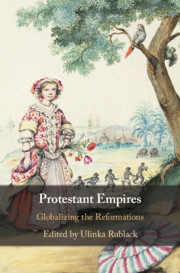Book contents
- Protestant Empires
- Protestant Empires
- Copyright page
- Contents
- Figures
- Contributors
- Introduction
- 1 Reworking Reformation in the Early English Atlantic
- 2 Puritanism in a Local Context: Ministry, People, and Church in 1630s Massachusetts
- 3 Learned Reading in the Atlantic Colonies: How Humanist Practices Crossed the Atlantic
- 4 Portable Lives: Reformed Artisans and Refined Materials in the Refugee Atlantic
- 5 Idolatry, Markets, and Confession: The Global Project of the de Bry Family
- 6 “Better the Turk than the Pope”: Calvinist Engagement with Islam in Southeast Asia
- 7 Inventing a Lutheran Ritual: Baptisms of Muslims and Africans in Early Modern Germany
- 8 Conversion and Its Discontents on the Southern Colonial Frontier: The Pietist Encounter with Non-Christians in Colonial Georgia
- 9 Globalizing the Protestant Reformation through Millenarian Practices
- 10 Global Protestant Missions and the Role of Emotions
- 11 The Sacred World of Mary Prince
- 12 New Perspectives on Gender and Sexuality in Global Protestantism, 1500–1800
- Index
8 - Conversion and Its Discontents on the Southern Colonial Frontier: The Pietist Encounter with Non-Christians in Colonial Georgia
Published online by Cambridge University Press: 20 August 2020
- Protestant Empires
- Protestant Empires
- Copyright page
- Contents
- Figures
- Contributors
- Introduction
- 1 Reworking Reformation in the Early English Atlantic
- 2 Puritanism in a Local Context: Ministry, People, and Church in 1630s Massachusetts
- 3 Learned Reading in the Atlantic Colonies: How Humanist Practices Crossed the Atlantic
- 4 Portable Lives: Reformed Artisans and Refined Materials in the Refugee Atlantic
- 5 Idolatry, Markets, and Confession: The Global Project of the de Bry Family
- 6 “Better the Turk than the Pope”: Calvinist Engagement with Islam in Southeast Asia
- 7 Inventing a Lutheran Ritual: Baptisms of Muslims and Africans in Early Modern Germany
- 8 Conversion and Its Discontents on the Southern Colonial Frontier: The Pietist Encounter with Non-Christians in Colonial Georgia
- 9 Globalizing the Protestant Reformation through Millenarian Practices
- 10 Global Protestant Missions and the Role of Emotions
- 11 The Sacred World of Mary Prince
- 12 New Perspectives on Gender and Sexuality in Global Protestantism, 1500–1800
- Index
Summary
From his arrival in Georgia in 1734 to his death in 1765, the Pietist pastor Johann Martin Boltzius spent more than thirty years on the southernmost frontier of Britain’s North American empire. There he served as leader of Ebenezer, a small community of Protestant refugees from the Catholic territory of Salzburg driven from their homeland on account of their beliefs. In sponsoring Boltzius’s enterprise, his Pietist superiors in Germany had also assigned him missionary duties aimed at Christianizing Georgia’s indigenous population. Conversion of the Native population was only one part of a broader Pietist vision, a global program of spiritual renewal designed to evangelize the world and bring forth the Kingdom of God. Accordingly, Boltzius’s missionary efforts in Georgia also targeted other non-Christian peoples he encountered during his time in the colony. This contribution examines three in particular: (1) the small contingent of German-speaking Jews who had migrated to Georgia in 1733; (2) the colony’s Yuchi people; and (3) the growing population of enslaved Africans who began arriving after 1750 when the colony’s initial ban on the importation of slaves was formally repealed.
- Type
- Chapter
- Information
- Protestant EmpiresGlobalizing the Reformations, pp. 228 - 253Publisher: Cambridge University PressPrint publication year: 2020

